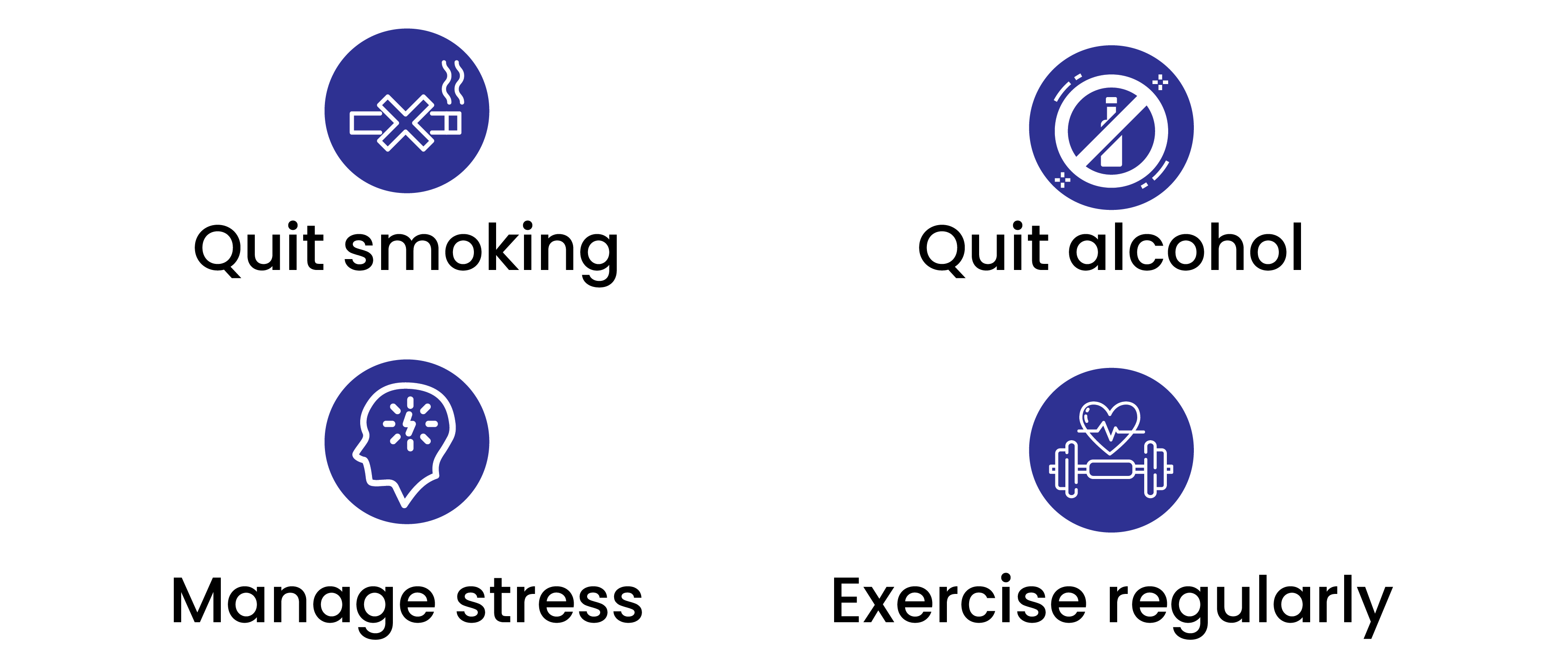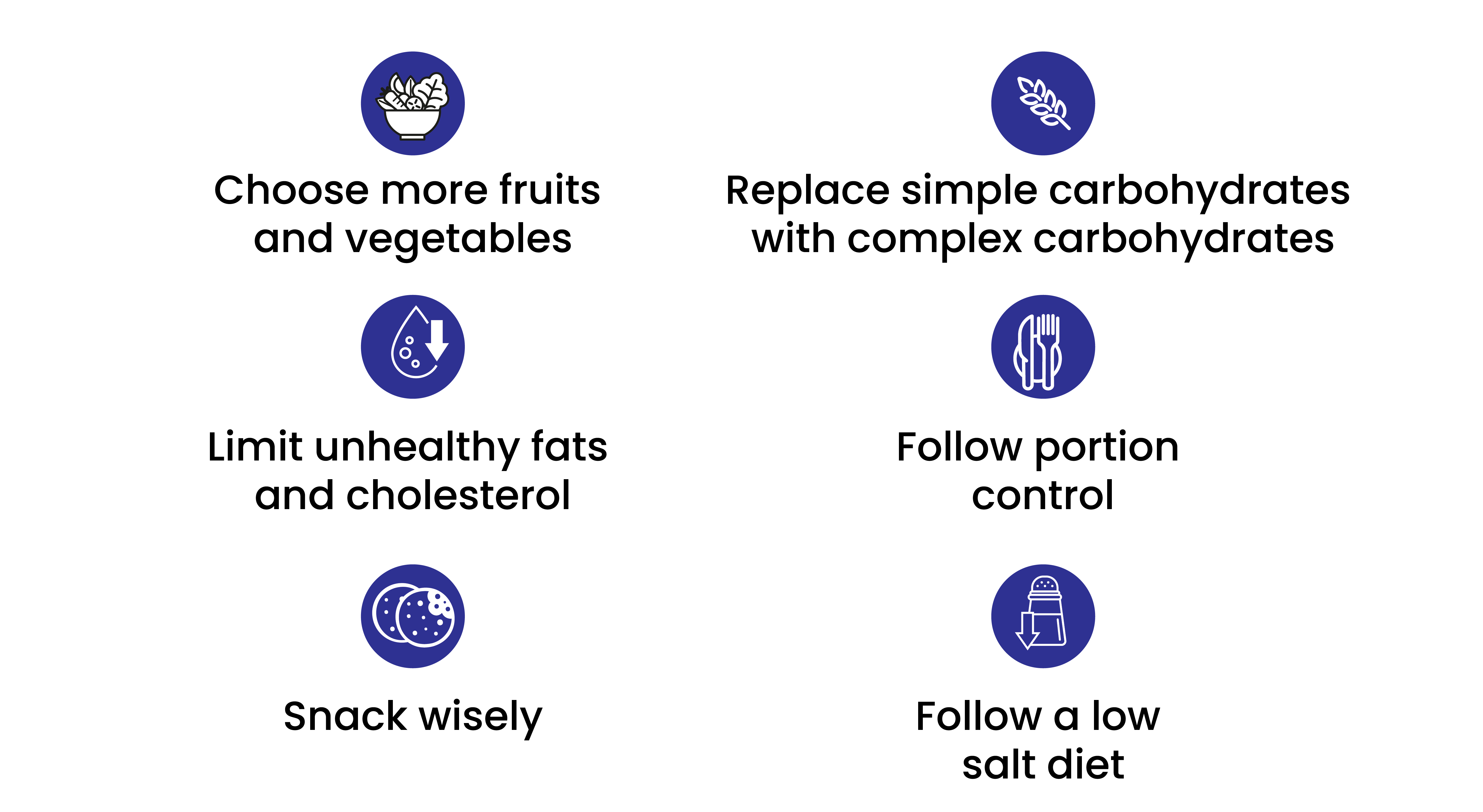A number of conditions can cause heart failure including:
- Heart attack
- High blood pressure
- Problems with heart valves
- Irregular heart rate or rhythm

At Narayana Health, we believe that knowledge is power. Knowledge and understanding of your condition, can help you can gain insight into ways to take better care of yourself and make necessary adjustments in your behaviours and lifestyle. This newfound understanding can motivate you to become more physically active, follow a healthier lifestyle and conscientious in adhering to your doctor's prescribed medications and guidelines. Implementing these measures can have a profound impact, enabling you not only to overcome your condition but to flourish and lead a thriving life.
A number of conditions can cause heart failure including:
These are the potential signs of heart failure:
Making changes begins with your lifestyle. These changes may not be easy, but know that they are absolutely essential!

Making healthy food choices and eating a well-balanced diet can make you feel significantly better.

Heart failure is when the heart fails to pump enough blood for the normal functioning of the body. This is a long-term chronic condition. During the early stages of heart failure, there may be no symptoms. Later, heart failure can lead to building up of fluid in the legs, abdomen and lungs. This stage is called congestive heart failure. Symptoms at this stage include, difficulty breathing with activity, difficulty breathing when lying down and bending, leg swelling, stomach swelling, nausea, and poor appetite.
Most people can improve with medications. Some may require surgery and/or devices like pacemaker or defibrillators. Very few people, who do not respond to medications may go on to needing heart transplant.
Heart failure is diagnosed with a thorough assessment of one's symptoms, clinical examination and an array of tests. Echocardiogram is a key test for diagnosis. Your doctor will also order tests depending on your condition and the suspected cause of heart failure, such as ECG, BNP or NT-proBNP, blood count, kidney function, liver function, thyroid test, urine test, cholesterol and diabetes test.
It is rare, but yes, a viral infection, similar to ones that cause common cold or viral fever, can cause heart failure. There is no absolute way to prove that heart failure has been caused by a virus. If you have significant breathing difficulty, leg swelling, abdominal swelling or fatigue with usual activity, following a viral illness or cold, particularly if you have other risk factors for heart failure, then you should visit a doctor immediately. Additionally, if you have heart failure, then a common cold or viral infection can worsen your heart failure symptoms.
One test alone cannot diagnose heart failure. Detection of heart failure requires a thorough clinical assessment as well as several tests. Certain blood tests can help with making a diagnosis in the context of the clinical picture. A test called B-type natriuretic peptide or N-terminal proBNP can help identify pre and overt heart failure.
One test alone cannot diagnose heart failure. Detection of heart failure requires a thorough clinical assessment as well as several tests. Chest X-ray can indicate if you have fluid filled in the lungs, which may be due to congestive heart failure, but also be due to other conditions. Chest X-ray can also show the size of the heart. However, a chest X-ray may also be normal in heart failure.
Heart failure does not mean that there is a complete failure of the heart. This condition means that the heart has become weak and struggles to pump enough blood to the rest of the body. In late stages, the heart can completely fail. There is also a type of heart failure, called heart failure with preserved ejection fraction, in which the heart becomes stiff and is unable to fill with enough blood, thereby is unable to pump enough blood to the body.
Yes, it is a serious and chronic condition that needs your immediate attention. The condition may get worse if timely treatment is not provided. Your doctor can discuss several options to manage the condition.
Optimal management of heart failure can ease the symptoms and patients can live a healthy and normal life for a long period. There are a number of medicines available that can improve quality of life and survival in the patients with heart failure. Devices like pacemakers and defibrillators, as well as certain surgeries or procedures can also help. Regular exercise and dietary modifications, based on your doctor's advice, may also help you feel better. In late stages of heart failure, if it fails to respond to medications, then heart transplant may be needed and it can help one feel better and prolong life. If you have heart failure, you should seek medical treatment immediately. The earlier it is treated, the better your response will be. Treatment should not be discontinued without your doctor's advice, even if you feel well.
BNP test is a blood test to measure the levels of a protein called B-type natriuretic peptide. A similar test is NT proBNP to measure the level of N-terminal-pro-BNP. The levels of both these proteins can be elevated in patients with pre and overt heart failure. This test will guide your doctor to make a diagnosis of heart failure. It may also show if your condition has improved, responded to medications or deteriorated. This can allow you and your doctor to assess the trajectory of your condition, prognosis and formulate an effective treatment strategy. To do this test, you will be required to provide a small amount of blood which is placed in a machine that measures the protein levels. Your doctor will discuss the results with you along with the treatment recommendations.
Founded in 2000, Narayana Health is one of India´s largest hospital networks with hospitals and heart centres across the country and an international hospital in the Cayman Islands. The group's facilities provide advanced medical care in over 30 medical specialities to both adults and children.